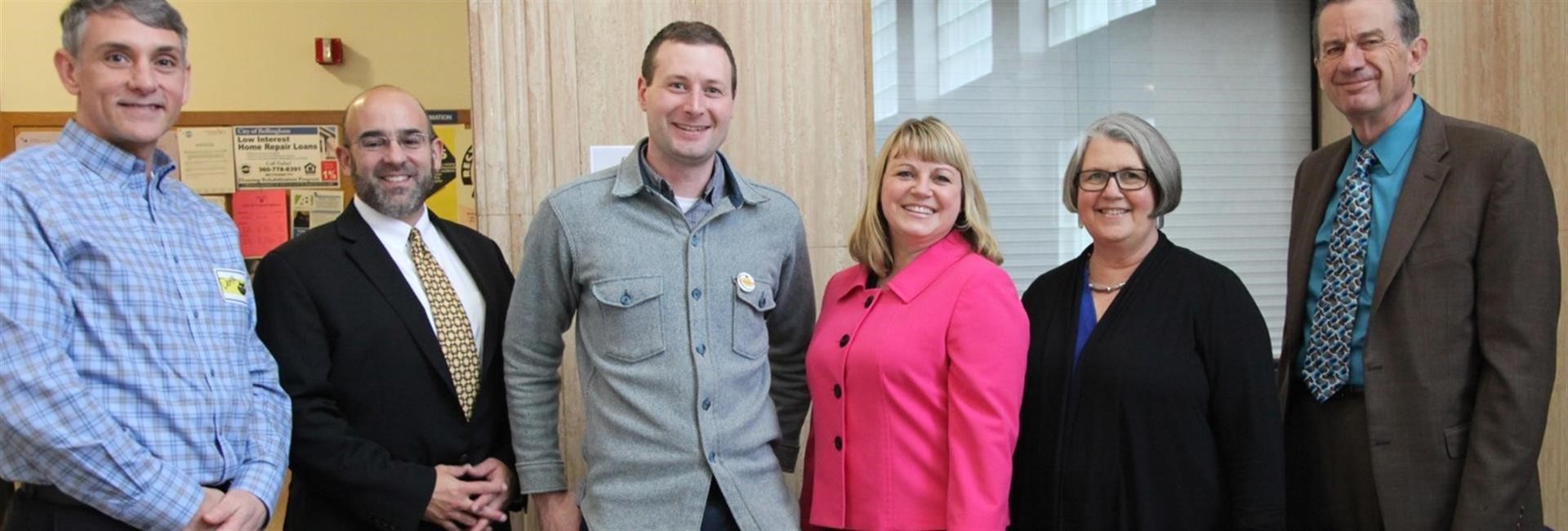
By Mark Gardner, Legislative Analyst / December 18, 2017
The city of Bellingham tied for third place in the final round of the Georgetown University Energy Prize (GUEP), a two-year, nationwide competition involving 50 communities to rethink the way America’s small and medium-sized towns and cities use energy.
In the final round, 10 top-performing cities and counties were evaluated on their energy-saving approach, performance, and prospects for nationwide replicability and scalability. The city of Fargo, North Dakota, took first place. Fort Collins, Colorado, placed second and Bellingham was tied for third place with the City of Takoma Park, Maryland.
“This is welcome recognition of the big strides we have taken,” said City Council President Michael Lilliquist, “and also a recognition of the additional strides we have planned for the future.”
“The communities that have participated in this competition have invented and implemented new approaches to reduce energy consumption and on that journey they have saved money and provided new leadership models for other communities to act. Their ingenuity and effective performance show us what is possible and will serve as valuable models for other communities seeking to innovate their practices,” said Energy Prize executive director Uwe Brandes.
A panel of judges representing academia and industry evaluated each community’s approach to energy efficiency, with scoring based on innovation; potential for replication; likely future performance; equitable access, community and stakeholder engagement; education; and overall quality and success. The winner was selected based on a combination of energy performance scores and the creation and advancement of new best practices over the course of the two-year energy-saving period.
Partners in the Bellingham effort – dubbed locally the Bellingham Energy Prize – included the Opportunity Council, Sustainable Connections, Western Washington University, Puget Sound Energy, RE Sources for Sustainable Communities, Cascade Natural Gas, Bellingham Public Schools, City of Bellingham, and the Northwest Clean Air Agency.
During the competition Bellingham saved almost 50 billion BTUs of energy, and reduced carbon emissions by 11,977 metric tons. Bellingham led with creative and inclusive programming to engage residents broadly and targeted harder-to-reach sectors of the population, including renters and multi-family units. Kilowatt Kitty, Bellingham’s energy efficiency mascot, was used to champion the campaign.
“Bellingham’s broad program included an aspirational net-zero goal to guide investment, while working toward short-term strategies to provide low-income residents with energy efficiency resources,” said Georgetown’s Brandes.
“Bellingham continues to be a community that leads the nation in energy and environmental performance. Thanks to all of our friends and neighbors, local businesses, schools and city government for all of their efforts to help us get there”, said Derek Long, Executive Director of Sustainable Connections.
According to Monica Cowlishaw, Energy Efficiency Manager for Cascade Natural Gas Corporation, “Cascade Natural Gas Corporation is thrilled to see the extensive efforts put forth by the Bellingham Community through the recent prize competition recognized at a national level. This Community, and the partnerships which have been established as part of the shared desire toward efficient use of our natural resources, is a stellar example to others looking for ways to reduce their impact on the environment through an inclusive and collaborative effort.”
Accomplishments of the Bellingham campaign include:
- Declaration of a citywide “Energy Year” in 2016, and innovative energy education partnerships with over 80 businesses
- A successful Solarize Whatcom residential solar campaign in 2016, and installation of a solar array on the Bellingham Food Bank
- Net zero pilot projects for single family and multifamily residences
- An energy education campaign for student renters
- A Green Power campaign that more than doubled its target
- Major energy-reducing facility investments by the City of Bellingham and Bellingham Public Schools
Momentum from the prize effort carried forward into activities in 2017 and beyond. The year 2017 saw another residential solar campaign, and major solar investments by the City are planned for 2018. Bellingham will begin implementing its soon-to-be-completed update to its Climate Action Plan, which identifies a number of activities to reduce energy use and greenhouse gas emissions Citywide, including efforts to encourage electric vehicle adoption, accelerate adoption of renewables, and additional adoption of efficient technologies in City and commercial facilities.
Media contact:
Mark Gardner, Legislative Analyst
City Council Office
360-778-8204
mgardner@cob.org
